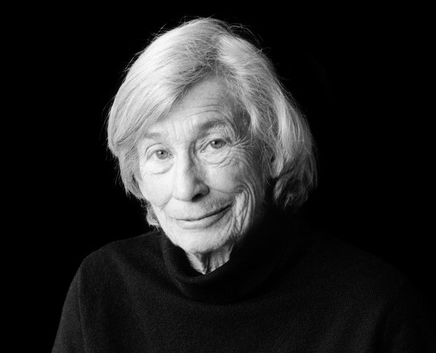High winds, full moon, pen and poetry in hand, we head out. It’s the only way I know to honor the poet who gave me a deep love of all seasons. So that’s just what my friend Emma and I do. Long ago, I was Emma’s English teacher, introducing her to the poet, Mary Oliver, who passed on January 17th. I taught my students her poems because I wanted them to go forward knowing “You don’t have to be good.” Also, I wanted them to know that poetry doesn’t have to be written in dense, difficult language, accessible only to the few, and the snobby.

Now Emma is a teacher, sharing Mary Oliver’s poetry with her students. She points out that when Oliver describes the sound of the wild geese, she does not use the words “sweet or easy.” She says their call is “harsh and exciting,” just like the journey of finding our place in the world.
It was a funny scene. Two women in the dark, in very puffy jackets, sliding backwards on ice, clutching poetry to our chests in a powerful headwind. We found a great sitting rock in a snowy field and opened our books. Then we raised our voices to the moon and read poem after poem from Oliver’s prolific life.
All my life, I have roamed through fields and mountains, asking questions. What is this life and how do I fit in it? I thought I was lazy and lost, because others were busy making money or starting non-profits, while I was scribbling in my journal. But then I found Mary Oliver’s poetry. And it saved me. She, too, chose to spend her days strolling through fields, and was brave enough to ask, “Tell me, what else should I have done?”
In my twenties, Mary Oliver taught me that I didn’t have to be perfect. In my thirties, she taught me that all poems should have birds in them. In my forties, she is teaching me to face death, and love my life.
When I received a scary diagnosis in 2016, I turned again to Oliver’s poetry. And for the first time, I noticed how much she writes about death, and how unafraid she is of it. “When it’s over, I want to say: all my life/I was a bride married to amazement.” In her bold acceptance of the end, I found a key to how to live in the moment, “Make of yourself a light.” But still, I struggled with the end, and letting go of my life.
I finally wrote Mary Oliver a letter. I said, “Thank you for teaching me that paying attention is a form of prayer. In recent days, especially, I have needed that. I was told that I only have a few months to live. I could use your wisdom now. In “Gravel,” you ask three times, “Are you afraid?” And I want to shout loud enough for you to hear me, “I am.” I wake up in the middle of the night, and wonder, Have I made something “particular and real” out of my life? Do you have any advice for me? Can you teach me to let go?”
I did not get a reply from Mary Oliver in the form of a letter. I never expected to hear from her. But I found answers in the shape of a fox’s den, and the remains of a dead rabbit at its entrance. I saw the bones and I noticed the healthy, playing fox kits, and I understood what she wrote in “In Blackwater Woods,” “To live in this world/you must be able/to do three things/to love what is mortal/to hold it against your bones…/and when the time comes to let it go/to let it go.”
Later, when I was faced with a tough choice about whether to undergo emergency surgery, I felt stuck. The safe thing to do was tell the doctors to perform a less-dangerous surgery that might buy me a few years. The more crazy choice was to tell the doctors to take big risks to try to save my life, for good.
I didn’t know what to do. Irrationally, I turned to poetry. I found my response in the last lines of Mary Oliver’s poem, “Moments,” “There is nothing more pathetic than caution/ when headlong might save a life,/ even, possibly, your own.”
I told the doctors not to hold back. Take every risk. Save my life. And they did.
Since then, I have a simple morning ritual that I have not broken. I wake, light a candle, and read a single Mary Oliver poem, chosen at random. Her words ground me in the wisdom of lilies and herons, grasshoppers, and goldenrod. The day and all of its chaos can begin, because I remember that I am a part of nature, not apart from it. And I remember that human nature, though tricky, bends toward love.
Yesterday’s poem happened to be “Flare.” “Let grief be your sister, she will whether or no./ Rise up from the stump of sorrow, and be green also/ like the diligent leaves./ A lifetime isn’t long enough for the beauty of this world/and the responsibilities of your life./ Scatter your flowers over the graves, and walk away.”
I can hear Mary Oliver’s gravelly voice and see her strong hand, waving, as if to say, “Go. I’m alright. Move along.” Or in her actual words in the poem, “October,” “This is the world. I’m not in it. It is beautiful.”
Last night, under a full moon, with pen and poetry in hand, we had to agree. The moon was so bright we could clearly see our hands, the trees, and the trail home, despite the darkness. It was beautiful. Thank You, Mary Oliver, for giving us the gift of light, and the gift of words that save lives.
Love,
Susie
***

